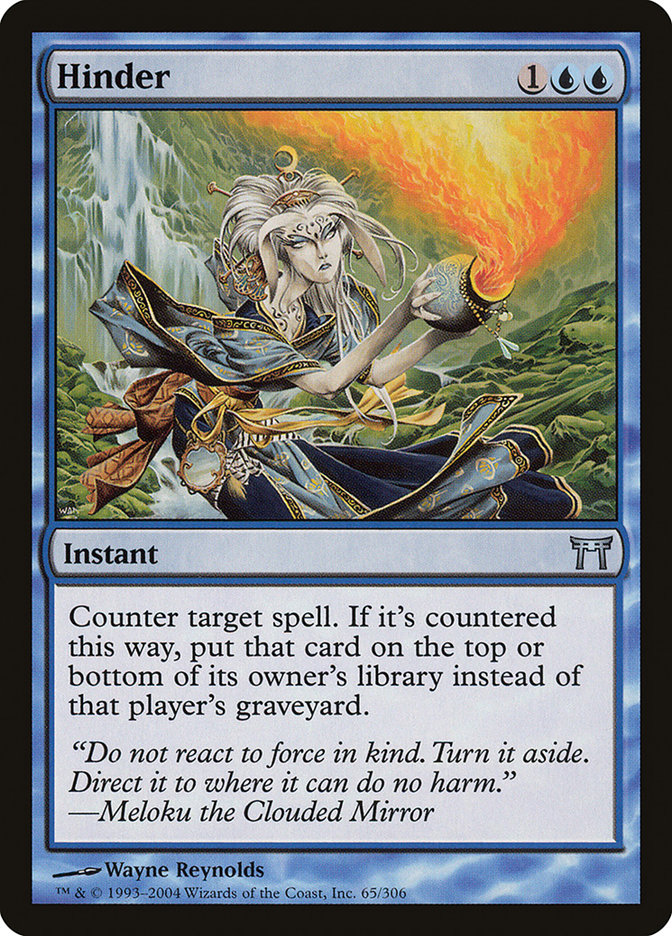“Actually, it’s about ethics in Commander Rules Committee reform…”
What is authority?
This question sounds far outside of the scope of what we’d usually encounter in a Magic article, but it is nonetheless a question for our age. That we are
living in an era of breakdown among top institutions is
a functioning journalistic hypothesis when looking at recent history through a broad lens, with the presumed authority held by diverse groups –
from local universities and the MLB to national governments and worldwide religions – fracturing in the wake of very visible scandals.
In our own little corner of the world, it’s not too long ago that Standard needed to be saved by extraordinary measures, banning Stoneforge Mystic and
Jace, the Mind Sculptor in acknowledgement of mistakes that did not need to be made. We see this routinely now in the Modern format, where the biggest
predictor of “will a card be banned” is only half-jokingly “is there a Modern Pro Tour coming up?” – it’s not the bad old days of taking Skullclamp and all
of the artifact lands out behind the woodshed, or even the emergency-banning of Memory Jar, but whether we mean to be or not, when it comes to bannings and
rules changes Magic players as a large group swing decidedly libertarian. We just want to play with the cards as they’re printed, and we don’t think that’s
too much to ask.
Two weeks ago, the Commander Rules Committee issued a public
statement changing a key rule that has been with Commander since its inception as “Elder Dragon Highlander;” while they did not change the banned
list, they did announce they were changing the “tuck” rule to expand upon an option extended to players when their commander changes zones. Previously,
whenever a commander would be exiled or go to the graveyard, its owner could choose to return it to the command zone instead – which literally did not exist before Commander but has proven a useful-enough pocket universe to see it incorporated into the real rules of the game – and the
Commander in question didn’t care about its zone of origin for that to be true. Now, with this rules update, that same option will be extended to other
zones as well: If a commander would change zones to go to the hand or into the library, that same optional replacement effect we use for exile and the
graveyard could be exerted, returning it to the command zone instead.
The reasons given are myriad; the responses have been equally so. Let’s look at one comment, which I have anonymized because its point of origin is not
relevant, the comment is fairly generic and we will be asking it to stand in for a broad swath of opinions:
I have to say that I’m disappointed with this change, and a bit puzzled about its origin. Like others have said, there was no outcry for this change… and the rationale given for it is suspect. I’ve disagreed with the RC in the past, mainly concerning the ban list, but this is the first time I’ve chosen to ignore it entirely.
I was also under the impression that the RC has input with the Commander products, yet Oblation and Chaos Warp were just reprinted, and are now considerably weakened. Then there are cards like Spell Crumple, which were created specifically with this aspect of the format in mind. Changes like this lead me to wonder if someone on the RC just had a few bad experiences against tuck and took it out on the rest of us.
This out-of-left-field ruling, combined with the reality-defying reasoning for it, leads me to one very disheartening (though admittedly melodramatic) conclusion: I no longer have confidence in the RC as the stewards of this format, and can no longer abide by their rulings.
I hate to say it, but I see a lot in common here with the broader political universe we live in – this crisis of authority, to the degree we are
experiencing it here within our community, comes part and parcel of everything else we experience. So what is authority, and how is it earned?
In this case, the validity of the authority is (at least to me) beyond question: The format as a whole exists today because five people sat down with the
idea of inventing Elder Dragon Highlander as a format, and when they enjoyed themselves, they worked to share that experience and advocated for it to grow
wide enough to reach the entire Magic community. We may have different variants that are preferred in some places over others – the French 1v1 rules, and
now the “Tiny Leaders” rules, nonetheless fit beneath the broader idea of the Commander format – but the Rules Committee literally has one of those first
five Elder Dragon Highlander players as a steward of the format, and it exists in the first place because of the efforts of those who have advocated for it
since its inception.
Unlike every other format, this is not a top-down experience where Wizards of the Coast dictates the format rules and maintains the banned and restricted
list to moderate the experience players have as they play the format. (And contrary to any private opinions, Sheldon still doesn’t design any of the cards
for the format or have input in what cards make it into official products.) This is a bottom-up format, and its advocates have said all along that they
favor play experience as its primary characteristic – and that they moderate both the banlist and the rules in accordance with their perception of the play
experience, a complicated task when you consider that Commander has now become an internationalized format. Commander is primarily a social format, and
maintaining enjoyable social experiences across cultural boundaries strikes me as a devil of a task… and yet the format has nonetheless grown under its
own strength considerably since the first game was played with Nicol Bolas, Chromium, Arcades Sabboth, Palladia-Mors, and Vaevictus Asmadi at the helm.
Sheldon Menery responded to the Rules Committee’s update with his own, fuller
accounting of the rules change, putting it in the broader context of other rules changes that have been made for consistency’s sake in order to
streamline the format and improve its overall experience. Their desire to update the tuck rule comes in the same progression as their update to the “color
identity” rules – which allowed some oddball commanders, like the legendary artifact creatures with colored mana activated abilities and Thelon of
Havenwood, to finally be played – or their recent update removing “Banned as a Commander” as a sub-category, replacing it with outright bans of any such
offending cards. But while those rules changes were equal in scope, they were not equal in effect – or in backlash.
The perspective common to those who dislike this recent rules change boils down to this: tuck has been a vital part of their ability to control abusive
opponents, and their inability to handle opponents in this way weakens their enjoyment of the experience because they now foresee wave after wave of
obnoxious Skitheryx, Zur, Kaalia, and Derevi decks poised to run their tables. There are two huge flaws with this perspective, and one major oversight –
let’s begin with the oversight before we get to the flaws, as it should put everything else in proper context.
When the Rules Committee announced this change, they chose the perspective of a new player experiencing Commander for the first time. Universally, as a
whole, the backlash is coming from very experienced players – not the new players they used to be, who are so far in their personal rear-view mirrors they
cannot remember what it was like to sit down at that table for the first time and try out something new. Experienced players are well-used to the rules as
they learned them, and the metagame those rules have fostered – with tuck considered both fair play and just punishment for those who would abuse the
social contract. To the Rules Committee, the social contract is the format – and we live in a very rough room, so this can be challenging indeed.
With tuck considered as fair play, many a newcomer has found out the hard way that that rule exists, and they found out by being shut out of the game
entirely. They spent all of that time building their deck, who knows how much money or time spent trading in order to acquire all of the peculiar
cardboard this format suggests we play, and then the care to sleeve it up and find opponents for their first foray into this new format.
Do you know what it feels like to try something new just to find out the hard way that you’re stupid? Because that is the level of discouragement that a
new player faces when they only find out about some corner-case rule you didn’t think meant anything by having it stuffed down your face. I’m a Magical
dinosaur at this point, so I remember many a cataclysmic rules change – I come from the days when damage hadn’t learned how to use the stack yet and we
resolved spells in batches, so I’ve weathered many a shift. The first time I found out about an obscure little segment of the rules involved an opponent
who just had a few lands, some mana artifacts, and a Zuran Orb in play – then they announced they were casting Balance and asked to close the interrupt
window.
“The interrupt window?” I imagine I must have asked. It’s far too long ago to have a credible memory about, and my recent waxing nostalgic about a Draft combo that never existed
would cause me to call it into question anyway…
“So the interrupt window is closed, then?” they probably asked. Then they sacrificed all of their lands to Zuran Orb, and I re-read their damn card.
“Counterspell that!” I might have said, realizing with horror that their spell was going to clear my board – I had no more lands in hand and I really liked
my creatures, and situations like these are exactly what counterspells were made for.
“…You can’t. n00b.” (Okay, that last is obviously pure fabrication – it wasn’t “cool” or even common Internet parlance to call people “newbs” for
practically a decade still. But it fits.)
I first discovered a rules loophole to call my own in a similar vein around the time of Mirage Block Constructed; still fixated on that ridiculous
experience with Balance, it should come as no surprise that I was fascinated by Equipoise. (I remain so to this day – at least in Commander. I keep trying
to make the darn thing work, and even succeed sometimes.) Combine Equipoise with Sands of Time just to skip all untap steps and suddenly phasing doesn’t
work as intended; anything you force to phase out will never come back, and your own things with phasing will never leave. Unwilling to be content with
just building a functioning Balance turn after turn, I needed to find my Zuran Orb – so to me, this combo was born:

Step into the shoes of a new player for a moment. You’ve stepped outside of your comfort zone and built a Commander deck to find out what people are going
on about – it seems to be pretty popular, and people tell you it’s really fun so you should try it. Having selected a commander that appealed to you for
whatever reason, you built a deck, you found some new cards you’d never consider “good” otherwise, and sleeved the whole thing up to give it a try. Let’s
call it Rith, the Awakener – who doesn’t love Dragons and tokens and Naya colors? All good things, Rith.
“Cast my Commander – Rith, the Awakener! Awesome!”
“Hinder that to the bottom…”
Would you ever come back to play a second game? I’d understand if you wouldn’t. Many of us stayed on despite this flaw, and as we got more used to the
format, we called this format-chilling oddity a “feature” rather than a “flaw.” After all, once you knew the secret, you too could stop people’s decks from
doing what they wanted it to and rack up undeserved wins!
Let’s look at those flaws I mentioned earlier: that tuck has been a vital part of peoples’ ability to control abusive opponents, and that removing tuck
from Commander weakens peoples’ ability to handle opponents will lead to uncontrolled waves of obnoxious Skitheryx, Zur, Kaalia, and Derevi decks poised to
run their tables.
I find it difficult to believe that we’re going to see many waves of abusive commanders running the tables because tuck is gone – but I say that as the
“public figure” (and at best, G-list “celebrity”) most likely to advocate for more cheap spot removal in people’s Commander decks. The most important thing
to be able to do when an opponent wants to abuse the table is to be able to get in their way with a piece of cardboard – it can be a Swords to Plowshares
for their commander (…unless it’s Animar or one of the other obnoxious ones, in which case you’ll need a sweeper instead…) or an Arcane Denial, Lignify
if you’re creative or Meddling Mage if you’re mean. We favor everyone who plays commander being able to have a good, clean fight – within the broader
context of the metagame, and a hard-to-pin-down social contract of what is fair play and what’s a foul.
The best way to live to the end-game and enjoy the middle-game is to plan for your survival in the earlygame. The best way to do that is during
deck construction, so we don’t face problems like this one:
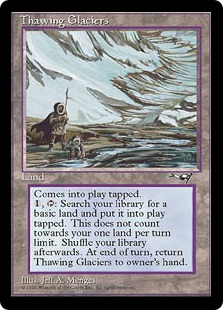
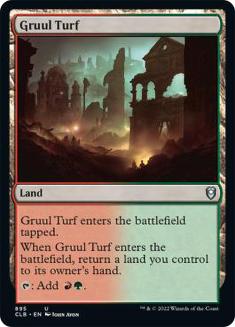



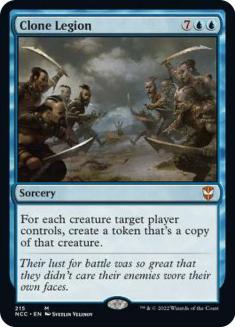
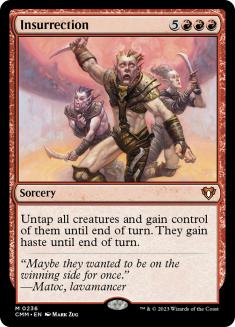
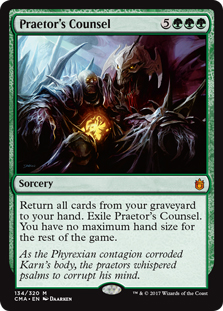

This hand has some awesome things going on – with just four lands we nonetheless know where our first seven land drops are coming from, and we even get
some acceleration out of the deal thanks to our bounceland picking up Thawing Glaciers on turn 4. On turn 5, we can have six mana if we need it or re-play
our Thawing Glaciers and keep developing for future turns, and we have some huge top-end spells once we get there. We’re doing powerful things if only we
draw things in the meantime – but because of that, this hand full of awesome cards and replete with neat tricks is literally unkeepable. We will
die before the first bomb is dropped.
In this example, it doesn’t matter whether your opponent’s commander was fair or broken – or even whether they ever cast it at all. You’re the proverbial
goldfish against which people test their broken decks, you cannot do anything and thus you have no relevance to the game. If you get taken out,
that’s your fault – and it doesn’t matter whether your “answer” card is a Hinder to tuck an opposing commander or a Chaos Warp, a Flame Slash or basic
Counterspell would do as much to keep Kaalia off your back in an average game.
If you play enough removal and earlygame interaction, you don’t need to lean hard on a smaller number of more powerful removal effects. I’ve played all the
tuck cards too in my Commander decks – but rarely to catch a commander with, mostly because keeping a card from sitting in the graveyard is the best way to
keep it from coming back to haunt you; Commander is the “recycle all your stuff” format. Exile effects are equal in usefulness to any of the tuck cards and
usually cheaper, and the key to surviving many a game will be having a low-cost answer to problematic creatures that you can deploy at instant speed while
you spend your own turns doing other things. Tooth and Nail with entwine? Whatever two-creature combination they’re going for, Swords to Plowshares will
likely at least make sure you get to live until you untap.
Tuck has been a crutch in this regard, a way for people to skimp on removal spells in order to have an outsized effect with the ones they actually draw. I
can’t honestly remember the last time I tucked a commander (…or even had my own tucked…) because I play more cheap removal than pretty much anyone else
I know, and it seems to work well: Maybe I don’t win every game, but I don’t just die during the start of the game either, and in the middle stages I can
rely on the fact that I’ll either win or lose based on whether I play my cards right.
But I at least acknowledge that’s just my opinion, and that the plural of “anecdote” is not “data.” The common sentiment floating around out there is that
tuck wasn’t broken, it was necessary, and they and their friends all knew that it was keeping things in check so people don’t abuse the heck out
of each other.
Here’s the dirty secret: With or without “Tuck,” I abuse the exact same number of people – zero. Sometimes this has been untrue, to prove a “political” point of my own in
the format, but even then I’ve been the sort to apologize in advance. Do the five-minute-turn craziness, put an arbitrarily large number of
copies of Tendrils of Agony on the stack in order to clear the table, sure… but, having declared victory, I get up and walk away so they can go back to
playing Commander as if I were never there.
People need to get up and walk away more – and not just when they are being “That Guy.” The problem we face is not Big Government, it’s small people – the
most important lesson I have to impart in this column is self-empowerment and a willingness to advocate for your own experiences, and the most powerful way
to control an out-of-control player is not to tuck their Commander, it’s to get up and walk away.
We worry about whether we need to adjust the Poison rules so that we can take fifteen or twenty Infect damage from Skitheryx before we die, or whether
Derevi will overwhelm the table if we aren’t able to Oblation her. What we need to actually remember is that the basic atom of a game of Commander
is consent, and if you don’t want to play the same way as someone else at the table is, you’re always free to stand up and move to another table.
If enough people do this enough times, it doesn’t matter how powerful their commander may be – in the end, they’ll just be sitting at a table by themselves
with their deck in their hand feeling rather unfulfilled.
In the modern era, we have well-established political rules, centuries of settled law, and the vast machinery of the state to contend with. Our government
employs millions in its myriad functions, from education to taxation to food safety, touching our lives every day and in every way. In many ways the laws
and functions of the state shapes our lives at a fundamental level, as the calcified expression of social norms and best practices impose themselves upon
us and require our compliance “or else.” And through our daily lives we shape it right back, weathering away the places where they rub up against us unduly
so that it ceases to interfere where it does not protect ourselves or others via a necessary restriction. Through this daily interaction, the individual
can erode an overgrowth of the state – just add enough people and a new social norm will overcome the tendency to enforce an old one. And at regular,
predictable intervals well-broadcast in advance, many individuals can shape the state more directly through voting, democratically selecting
representatives who will act as our proxy and serve our interests in the administration of the government, to shape the state with conscious purpose before
it intrudes in our lives.
We don’t need to listen to the Commander Rules Committee if we don’t want to, it’s true. If enough people truly believe that taking away the tuck rules was
reason to make a break from a rules committee they had no hand in putting into place, they could – there was no election, so the only way to truly hold
them accountable is to decide to listen to them when you agree with them and decide not to listen to them when you don’t. But thinking that we need tuck as
a mechanism to control unruly players forgets the basic facts of personal agency: you can always just walk away from any game being played in a way you don’t approve of. The problem is not the experienced players – we can, and
do, walk away from someone who isn’t playing with appropriate restraint to make sure that the game is at least interactive as they do their powerful
things. The problem is the newer players: They don’t walk to another table and try another game, they just walk away.
The shift to the tuck rules announced two weeks ago unify how commanders interact as they shift zones, giving individuals the agency to return their
commander to the command zone any time they might want should their commander leave play for any other zone. Instead of having to remember an exception –
you can for exile and the graveyard, but you can’t for bounce or tuck – there is a simple principle, and this takes away the main
feel-bad mechanism by which more-experienced players get a leg up against new Commander players. The Rules Committee believe this will have a beneficial
knock-on effect of letting people feel free to play fewer tutors, but they aren’t really presenting data in defense of that belief or using it as a driving factor in their decision – they are also cognizant of the fact that Tutors are just a thing you find in Magic, and people
are going to play however many of them they want to. Their desire to see less tutoring is a case in which they lead by example and hope others will follow
in keeping with the spirit of the social contract, but not actually indicative of a problem – there’s a big difference between tutoring to do fun or
awesome things and tutoring to reassemble, yet again, your Helm/Leyline combo or Niv-Mizzet/Curiosity.
By focusing on the tutoring argument – which was a personal preference anyway – opponents of the rules change are latching onto a subjective thing against
which they can nitpick while missing the entire argument in the first place. The question was a large one: How do you retain new players, and are the rules
actually helping with that or hindering it?
Not everything is about you. This rules change is not about you.


